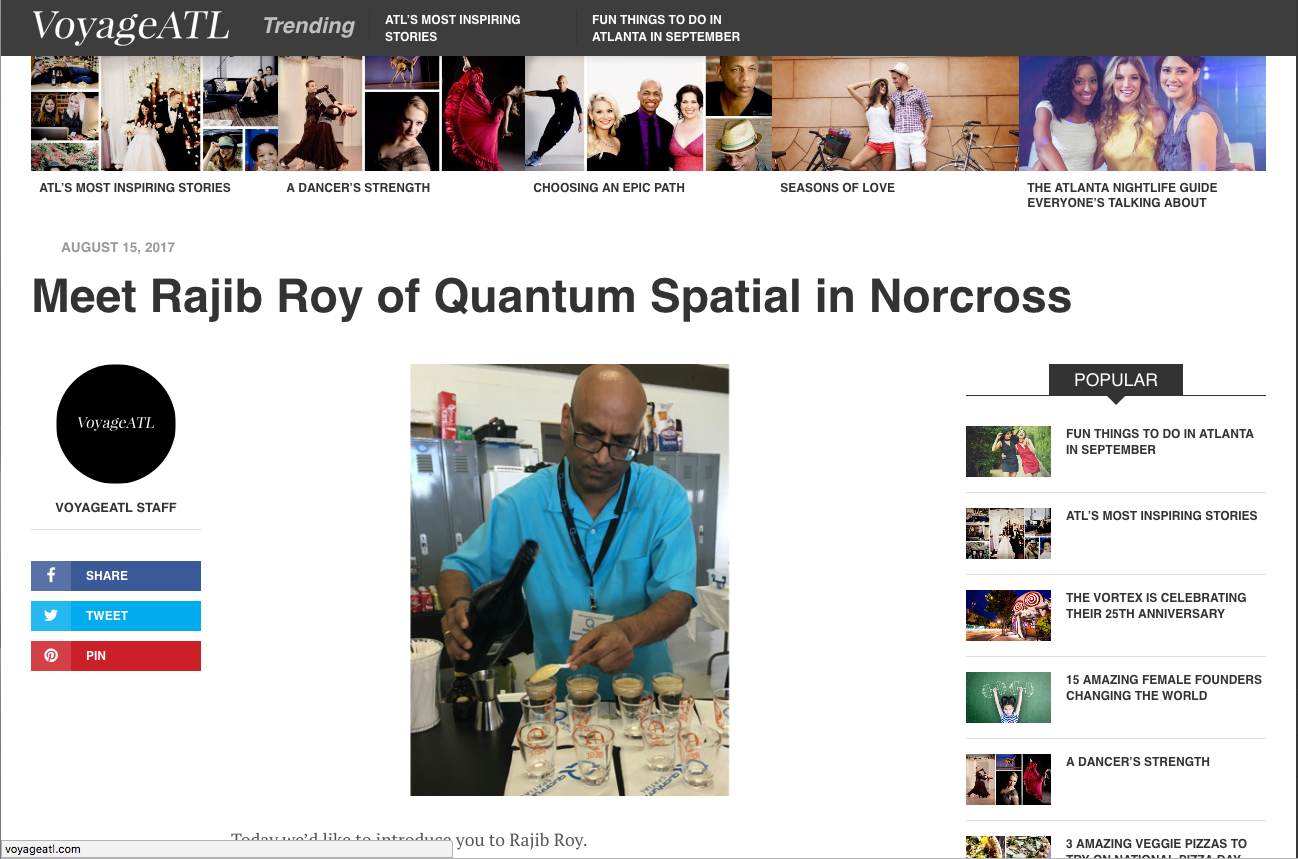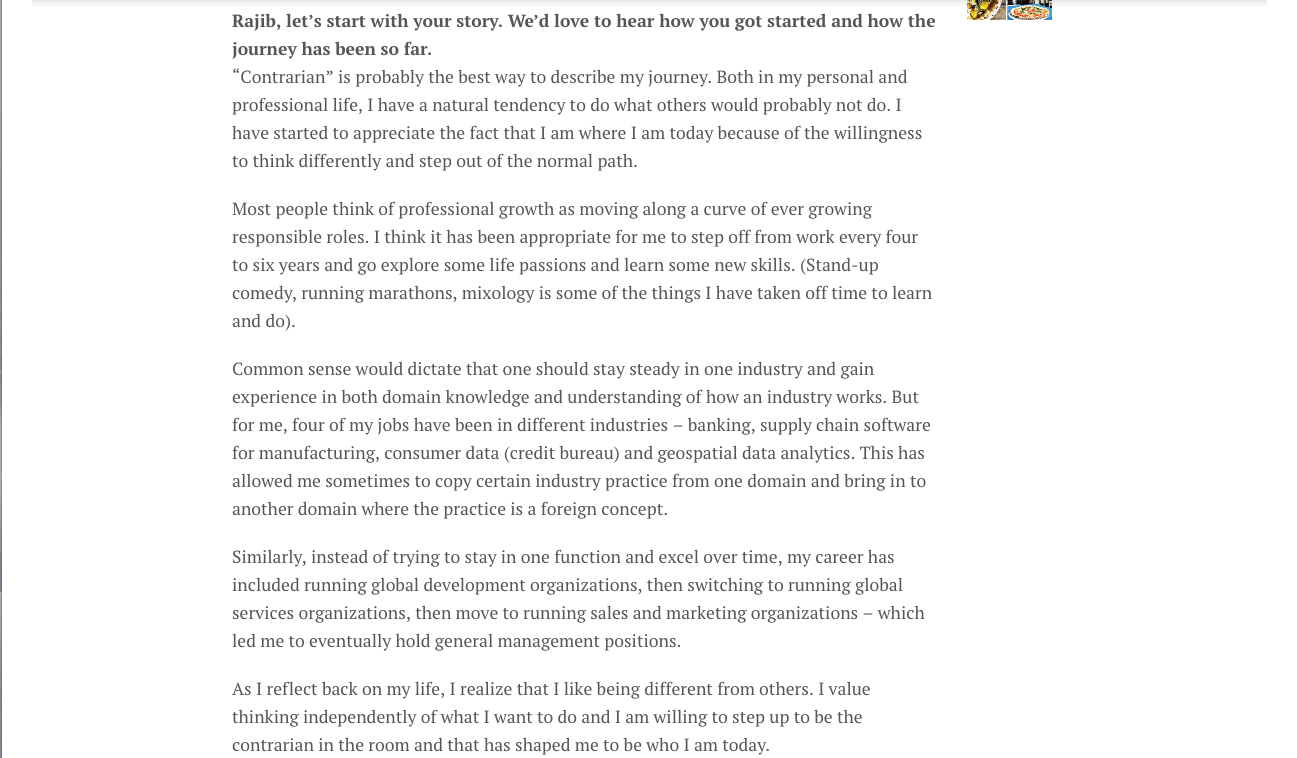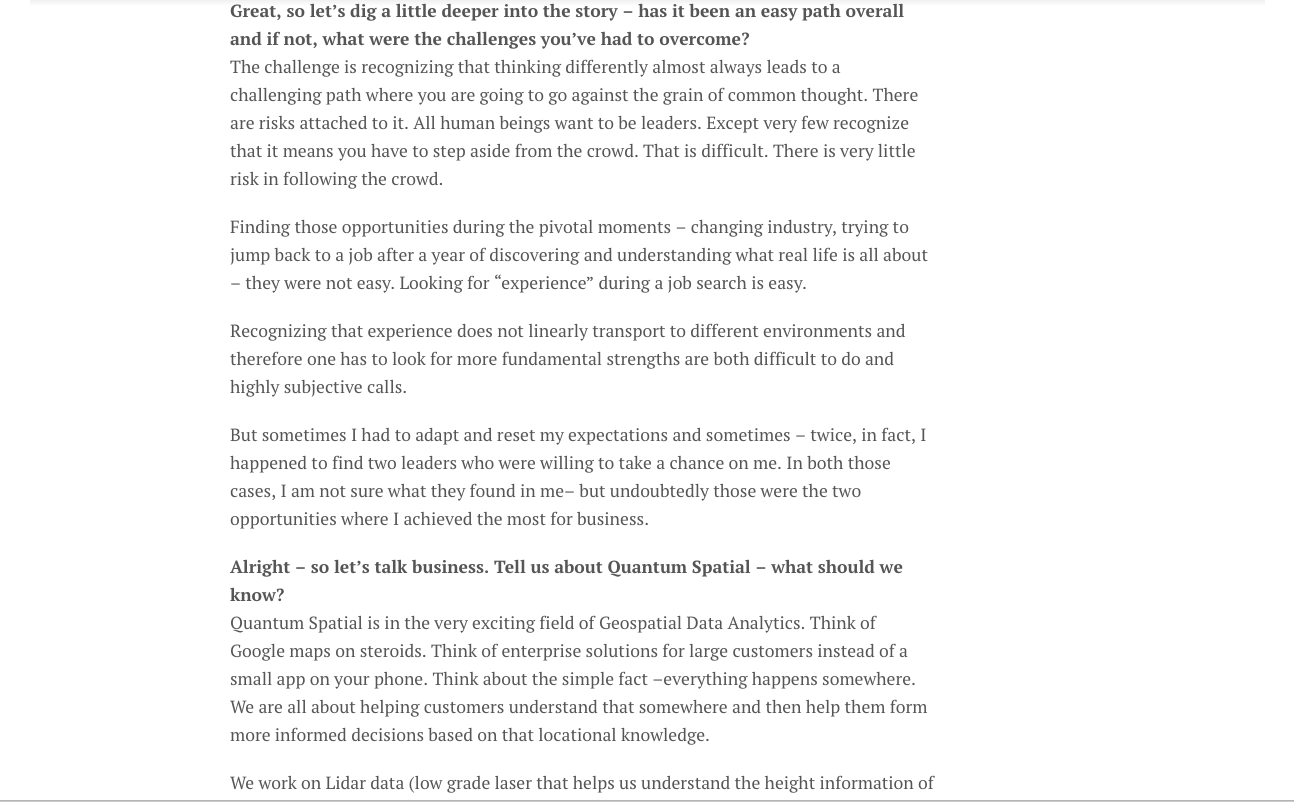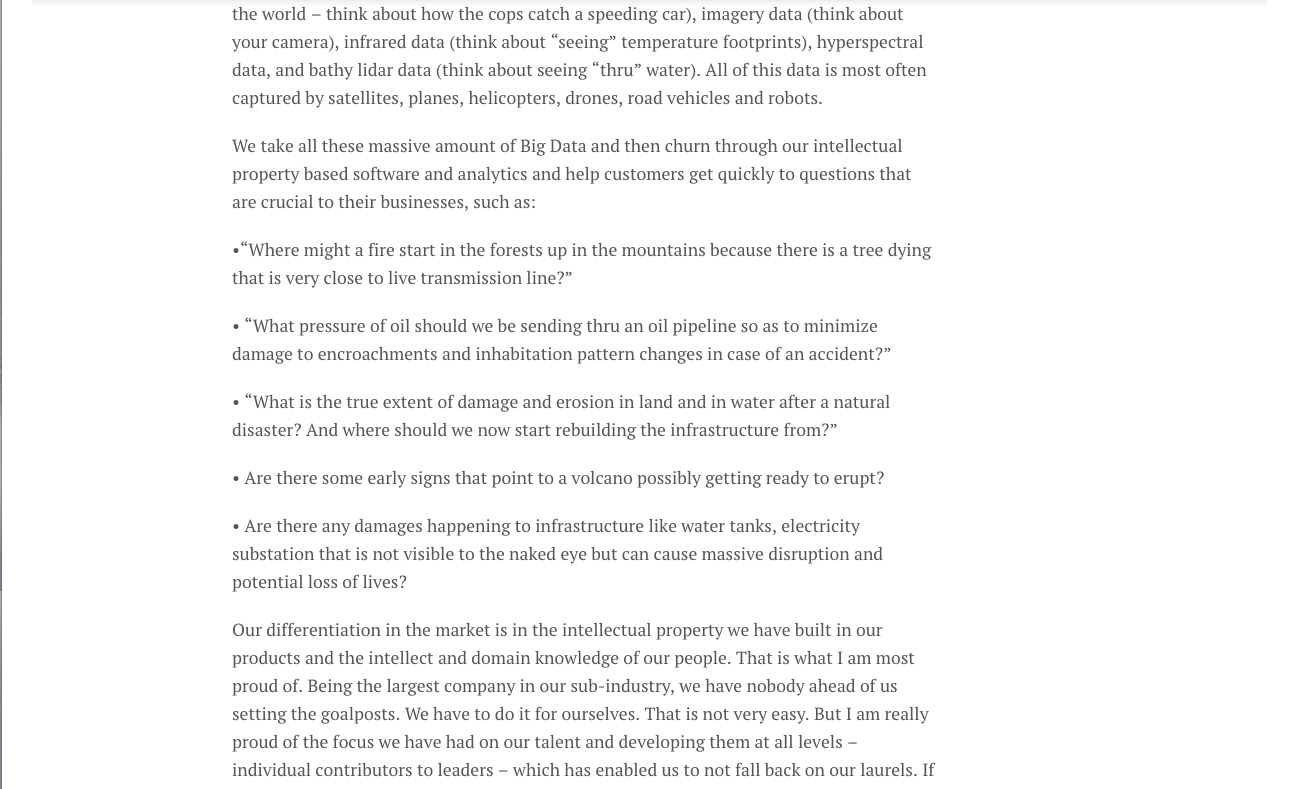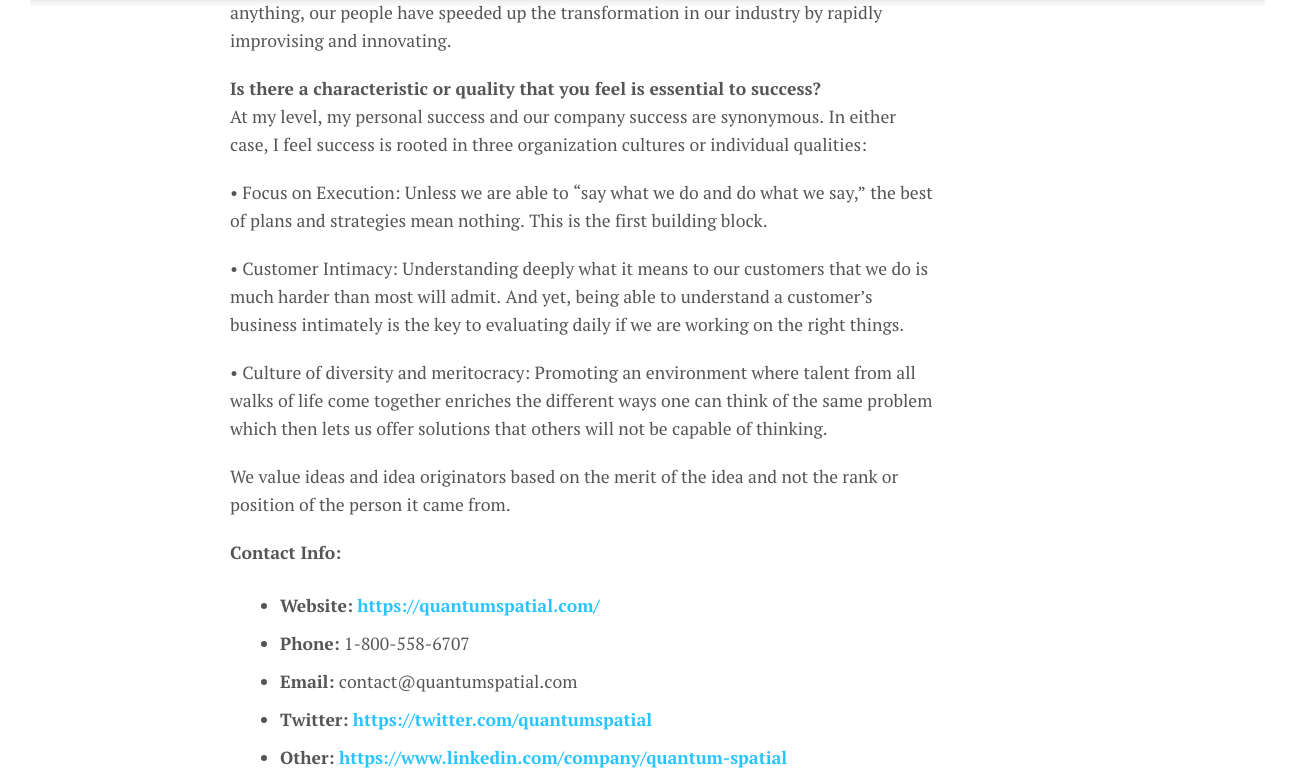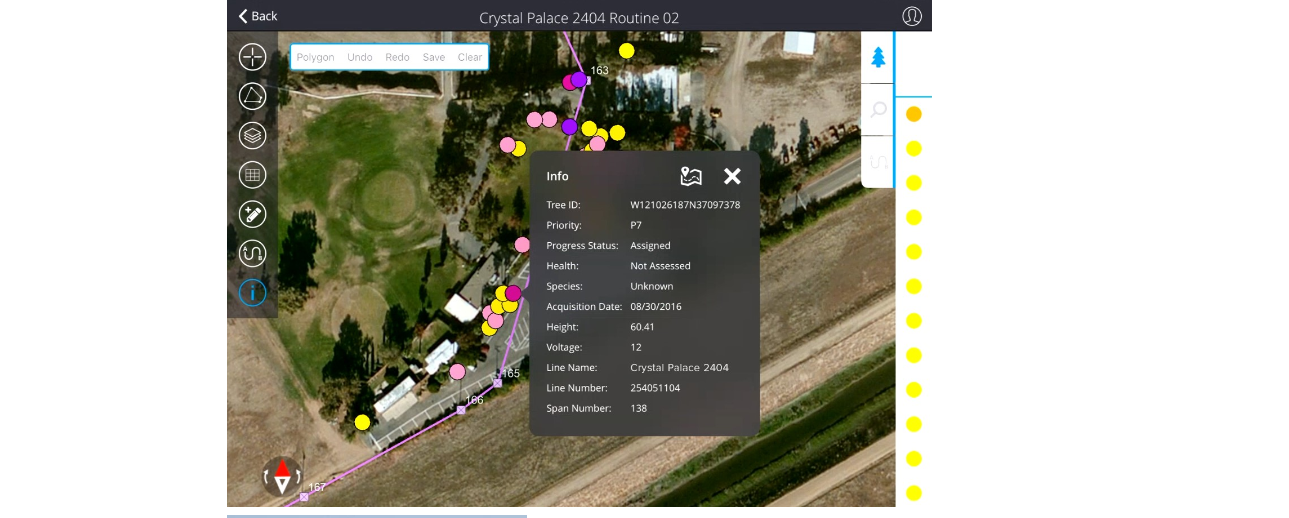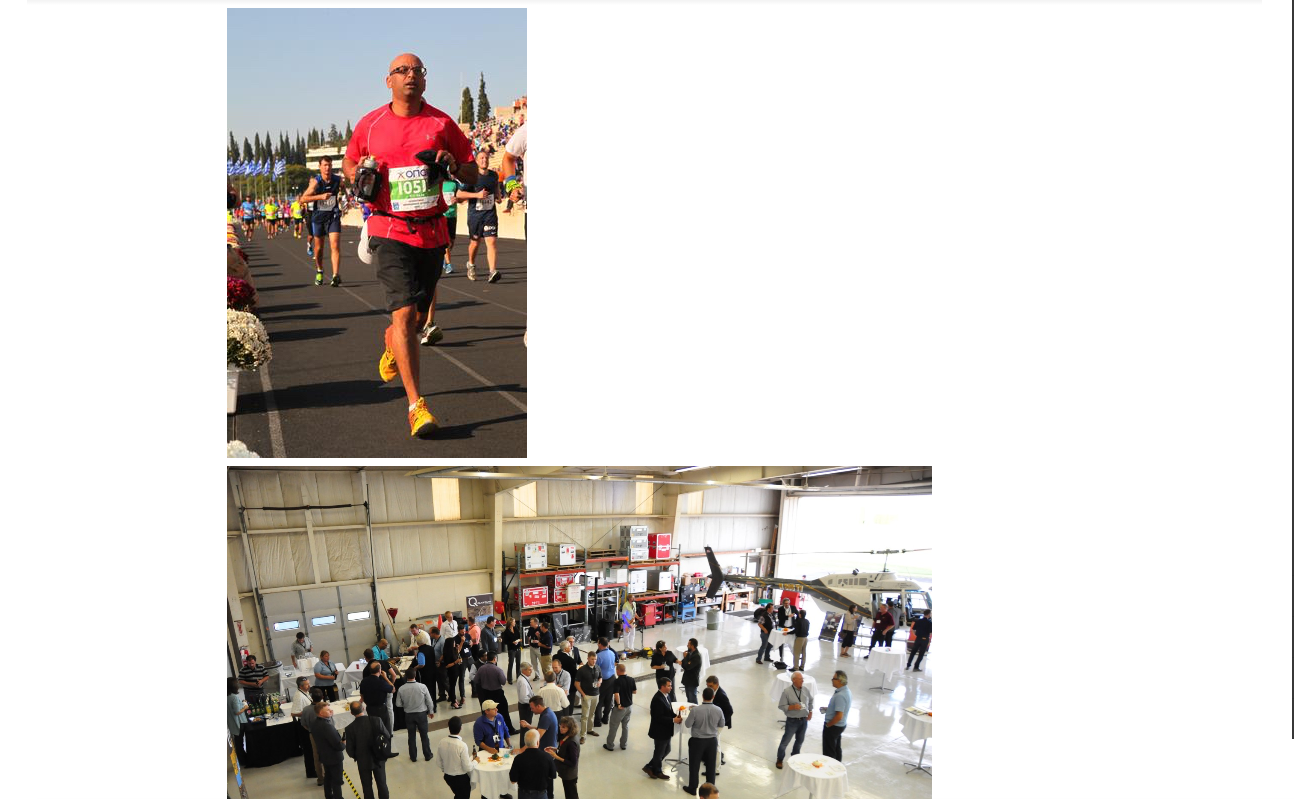Voyager Atlanta Press Interview
See the article here: http://voyageatl.com/interview/meet-rajib-roy-quantum-spatial-norcross/
Here is the text and screen shots:
Today we’d like to introduce you to Rajib Roy.
Rajib, let’s start with your story. We’d love to hear how you got started and how the journey has been so far.
“Contrarian” is probably the best way to describe my journey. Both in my personal and professional life, I have a natural tendency to do what others would probably not do. I have started to appreciate the fact that I am where I am today because of the willingness to think differently and step out of the normal path.
Most people think of professional growth as moving along a curve of ever growing responsible roles. I think it has been appropriate for me to step off from work every four to six years and go explore some life passions and learn some new skills. (Stand-up comedy, running marathons, mixology is some of the things I have taken off time to learn and do).
Common sense would dictate that one should stay steady in one industry and gain experience in both domain knowledge and understanding of how an industry works. But for me, four of my jobs have been in different industries – banking, supply chain software for manufacturing, consumer data (credit bureau) and geospatial data analytics. This has allowed me sometimes to copy certain industry practice from one domain and bring in to another domain where the practice is a foreign concept.
Similarly, instead of trying to stay in one function and excel over time, my career has included running global development organizations, then switching to running global services organizations, then move to running sales and marketing organizations – which led me to eventually hold general management positions.
As I reflect back on my life, I realize that I like being different from others. I value thinking independently of what I want to do and I am willing to step up to be the contrarian in the room and that has shaped me to be who I am today.
Great, so let’s dig a little deeper into the story – has it been an easy path overall and if not, what were the challenges you’ve had to overcome?
The challenge is recognizing that thinking differently almost always leads to a challenging path where you are going to go against the grain of common thought. There are risks attached to it. All human beings want to be leaders. Except very few recognize that it means you have to step aside from the crowd. That is difficult. There is very little risk in following the crowd.
Finding those opportunities during the pivotal moments – changing industry, trying to jump back to a job after a year of discovering and understanding what real life is all about – they were not easy. Looking for “experience” during a job search is easy.
Recognizing that experience does not linearly transport to different environments and therefore one has to look for more fundamental strengths are both difficult to do and highly subjective calls.
But sometimes I had to adapt and reset my expectations and sometimes – twice, in fact, I happened to find two leaders who were willing to take a chance on me. In both those cases, I am not sure what they found in me– but undoubtedly those were the two opportunities where I achieved the most for business.
Alright – so let’s talk business. Tell us about Quantum Spatial – what should we know?
Quantum Spatial is in the very exciting field of Geospatial Data Analytics. Think of Google maps on steroids. Think of enterprise solutions for large customers instead of a small app on your phone. Think about the simple fact –everything happens somewhere. We are all about helping customers understand that somewhere and then help them form more informed decisions based on that locational knowledge.
We work on Lidar data (low grade laser that helps us understand the height information of the world – think about how the cops catch a speeding car), imagery data (think about your camera), infrared data (think about “seeing” temperature footprints), hyperspectral data, and bathy lidar data (think about seeing “thru” water). All of this data is most often captured by satellites, planes, helicopters, drones, road vehicles and robots.
We take all these massive amount of Big Data and then churn through our intellectual property based software and analytics and help customers get quickly to questions that are crucial to their businesses, such as:
•“Where might a fire start in the forests up in the mountains because there is a tree dying that is very close to live transmission line?”
• “What pressure of oil should we be sending thru an oil pipeline so as to minimize damage to encroachments and inhabitation pattern changes in case of an accident?”
• “What is the true extent of damage and erosion in land and in water after a natural disaster? And where should we now start rebuilding the infrastructure from?”
• Are there some early signs that point to a volcano possibly getting ready to erupt?
• Are there any damages happening to infrastructure like water tanks, electricity substation that is not visible to the naked eye but can cause massive disruption and potential loss of lives?
Our differentiation in the market is in the intellectual property we have built in our products and the intellect and domain knowledge of our people. That is what I am most proud of. Being the largest company in our sub-industry, we have nobody ahead of us setting the goalposts. We have to do it for ourselves. That is not very easy. But I am really proud of the focus we have had on our talent and developing them at all levels – individual contributors to leaders – which has enabled us to not fall back on our laurels. If anything, our people have speeded up the transformation in our industry by rapidly improvising and innovating.
Is there a characteristic or quality that you feel is essential to success?
At my level, my personal success and our company success are synonymous. In either case, I feel success is rooted in three organization cultures or individual qualities:
• Focus on Execution: Unless we are able to “say what we do and do what we say,” the best of plans and strategies mean nothing. This is the first building block.
• Customer Intimacy: Understanding deeply what it means to our customers that we do is much harder than most will admit. And yet, being able to understand a customer’s business intimately is the key to evaluating daily if we are working on the right things.
• Culture of diversity and meritocracy: Promoting an environment where talent from all walks of life come together enriches the different ways one can think of the same problem which then lets us offer solutions that others will not be capable of thinking.
We value ideas and idea originators based on the merit of the idea and not the rank or position of the person it came from.
